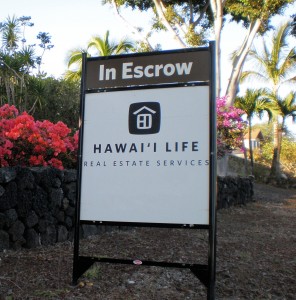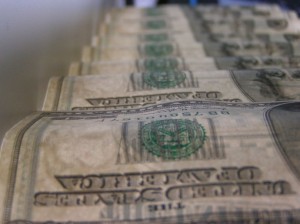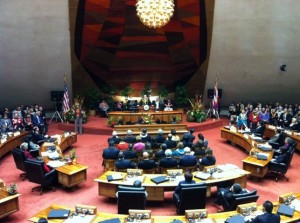ANALYSIS: Gay Marriage in Hawai`i – Benefits Beyond Tourism
A recently completed study by the University of Hawai`i Economic Research Organization has been making headlines across the state today, and the results are sure to spark debate between groups both for and against gay marriage in Hawai`i.
On the heels of the US Supreme Court ruling that struck down section 3 of the Defense of Marriage Act, UH researchers decided to revisit their estimates of how Hawaii’s economy might be impacted if the state were to legalize same sex marriage.
Prior to the Supreme Court ruling it unconstitutional, section 3 of “DOMA” had effectively barred same-sex married couples from receiving federal benefits.
In its landmark decision, the Supreme Court declared section 3 “a deprivation of the liberty of the person protected by the Fifth Amendment.”
Hawai`i of course recognizes civil unions for gay couples, but same sex marriage here remains illegal. According to the Obama administration, this means Hawaii’s gay couples aren’t eligible for federal benefits (with the exception of certain benefits for federal employees).
The recent report by UH researchers provides an appealing argument in favor of legalizing gay marriage in Hawai`i, claiming it would increase tourism revenue by $217 million over two years as gay couples and their loved ones travel to the islands to perform wedding ceremonies.
But while that figure is impressive (representing nearly $300,000 per day), that added revenue represents only a portion of the financial benefits the state would gain if gay marriage were to be legalized.
By overturning section 3, SCOTUS (the awkward-sounding acronym given to the Supreme Court) opened the floodgates to federal benefits for same-sex spouses, with more than 1,000 federal laws now applicable to gay married couples.
If the Legislature were to legalize same sex marriage, the UHERO study estimates that up to 1,957 gay couples would elect to marry by the end of 2016, meaning more than 3,900 people would potentially qualify for the myriad federal benefits unlocked by the SCOTUS ruling.
Among the most significant, these benefits could include:
Social Security Survivor Benefits
If a spouse dies, their survivor would now be able to collect their Social Security checks if the amount is higher than what the survivor was originally receiving.
This benefit alone could prove life-changing for aging couples, and could bring large revenues into the state of Hawai`i in coming years, percolating into the economy as seniors’ incomes grow (and lightening the burden on state services).
Retirement Plans and Healthcare Benefits
Under current law, Individual Retirement Accounts of deceased spouses can roll over into the survivor’s IRA without taxation. Gay couples who aren’t married can face significant tax penalties when liquidating a deceased partner’s IRA.
If gay marriage is legalized, same-sex married couples would also be eligible to receive Medicare spousal benefits and COBRA eligibility, reducing health care costs considerably.
Transfer of Assets
Gay couples would now be allowed to transfer assets from one spouse to another without taxation, as opposed to their current limit of $14,000 per year in “gifts” before incurring federal taxes.
This would allow Hawaii’s gay couples increased flexibility in their financial lives, enabling easier property purchases and business activity. That could prove quite beneficial for commerce.

Gay married couples now qualify for multiple tax benefits involving property ownership. Photo courtesy of Hawaii Life Real Estate Brokers.
Homeowner’s Exemption on Sale of Property
Under Internal Revenue Code §121, a single person can exempt $250,000 of profit on the sale of their principal residence from taxation (providing they have lived there for two years).
Married couples filing jointly can currently exclude up to $500,000. Assuming gay marriage were legalized, same-sex couples could double their tax savings on jointly held property sales, and that means more dollars available to be spent or invested right here in the islands.
Federal Estate Tax break
In the case that broke DOMA’s back, a surviving gay spouse challenged the taxes levied on her deceased partner’s estate. The SCOTUS ruling in that matter struck down the ability of the government to collect estate taxes from gay married couples, no matter the size of their estate.
While there may not be many gay couples living in Hawai`i who possess more than the previously exempt $5.25 million in assets, those who are exceptionally wealthy could stand to save 40% in federal taxation.
The SCOTUS ruling led New York state to grant retroactive refunds on estate taxes dating backwards at least three years, meaning Hawai`i legislators could conceivably face a ticking clock of sorts when it comes to helping residents exploit any refunds on estate taxes already filed.
Will They or Won’t They?
In the UHERO report, researchers noted that the longer Hawai`i waits to legalize gay marriage, the more likely same-sex couples are to seek out alternative destinations where they can legally tie the knot.
Likewise, the longer legislators here postpone such a decision, the more federal benefits same sex couples (and the Hawai`i economy at large) will be prevented from receiving.
The Legislature declined to take up the issue in its most recent session, instead opting for a “task force” to study the issue, with a report to be issued to the governing body later this year. As we understand it, the UHERO study was in no way related to the Legislature’s own inquiry.
With 2014 elections looming, it still remains to be seen whether Hawai`i politicians will have the will to debate an issue that has not only moral, but hefty economic consequences.
Sponsored Content
Comments







_1770333123096.webp)


